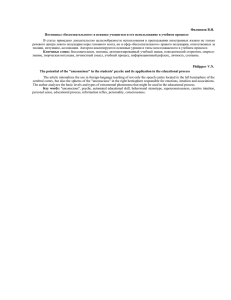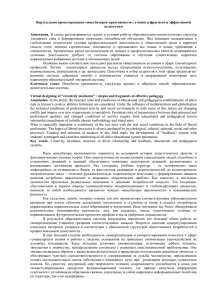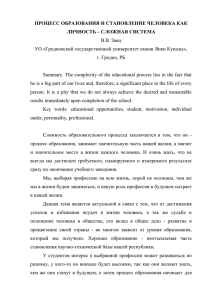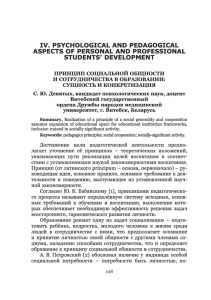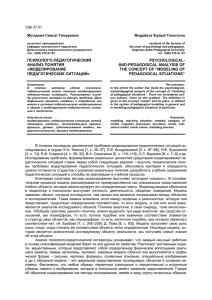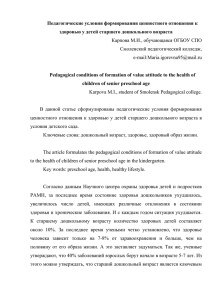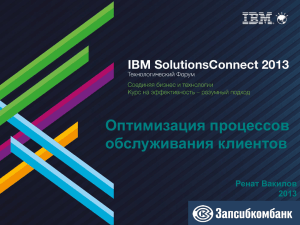36 - поддерживать желание детей отличить себя, свои традиции
advertisement
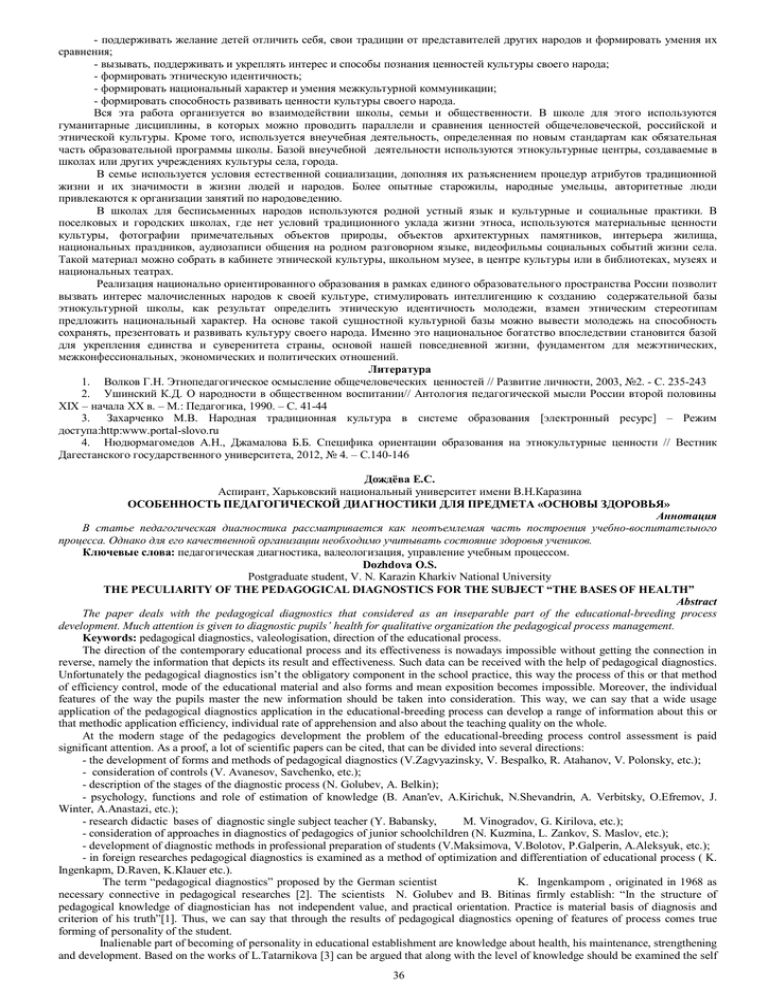
- поддерживать желание детей отличить себя, свои традиции от представителей других народов и формировать умения их сравнения; - вызывать, поддерживать и укреплять интерес и способы познания ценностей культуры своего народа; - формировать этническую идентичность; - формировать национальный характер и умения межкультурной коммуникации; - формировать способность развивать ценности культуры своего народа. Вся эта работа организуется во взаимодействии школы, семьи и общественности. В школе для этого используются гуманитарные дисциплины, в которых можно проводить параллели и сравнения ценностей общечеловеческой, российской и этнической культуры. Кроме того, используется внеучебная деятельность, определенная по новым стандартам как обязательная часть образовательной программы школы. Базой внеучебной деятельности используются этнокультурные центры, создаваемые в школах или других учреждениях культуры села, города. В семье используется условия естественной социализации, дополняя их разъяснением процедур атрибутов традиционной жизни и их значимости в жизни людей и народов. Более опытные старожилы, народные умельцы, авторитетные люди привлекаются к организации занятий по народоведению. В школах для бесписьменных народов используются родной устный язык и культурные и социальные практики. В поселковых и городских школах, где нет условий традиционного уклада жизни этноса, используются материальные ценности культуры, фотографии примечательных объектов природы, объектов архитектурных памятников, интерьера жилища, национальных праздников, аудиозаписи общения на родном разговорном языке, видеофильмы социальных событий жизни села. Такой материал можно собрать в кабинете этнической культуры, школьном музее, в центре культуры или в библиотеках, музеях и национальных театрах. Реализация национально ориентированного образования в рамках единого образовательного пространства России позволит вызвать интерес малочисленных народов к своей культуре, стимулировать интеллигенцию к созданию содержательной базы этнокультурной школы, как результат определить этническую идентичность молодежи, взамен этническим стереотипам предложить национальный характер. На основе такой сущностной культурной базы можно вывести молодежь на способность сохранять, презентовать и развивать культуру своего народа. Именно это национальное богатство впоследствии становится базой для укрепления единства и суверенитета страны, основой нашей повседневной жизни, фундаментом для межэтнических, межконфессиональных, экономических и политических отношений. Литература 1. Волков Г.Н. Этнопедагогическое осмысление общечеловеческих ценностей // Развитие личности, 2003, №2. - С. 235-243 2. Ушинский К.Д. О народности в общественном воспитании// Антология педагогической мысли России второй половины XIX – начала XX в. – М.: Педагогика, 1990. – С. 41-44 3. Захарченко М.В. Народная традиционная культура в системе образования [электронный ресурс] – Режим доступа:http:www.portal-slovo.ru 4. Нюдюрмагомедов А.Н., Джамалова Б.Б. Специфика ориентации образования на этнокультурные ценности // Вестник Дагестанского государственного университета, 2012, № 4. – С.140-146 Дождёва Е.С. Аспирант, Харьковский национальный университет имени В.Н.Каразина ОСОБЕННОСТЬ ПЕДАГОГИЧЕСКОЙ ДИАГНОСТИКИ ДЛЯ ПРЕДМЕТА «ОСНОВЫ ЗДОРОВЬЯ» Аннотация В статье педагогическая диагностика рассматривается как неотъемлемая часть построения учебно-воспитательного процесса. Однако для его качественной организации необходимо учитывать состояние здоровья учеников. Ключевые слова: педагогическая диагностика, валеологизация, управление учебным процессом. Dozhdova O.S. Postgraduate student, V. N. Karazin Kharkiv National University THE PECULIARITY OF THE PEDAGOGICAL DIAGNOSTICS FOR THE SUBJECT “THE BASES OF HEALTH” Abstract The paper deals with the pedagogical diagnostics that considered as an inseparable part of the educational-breeding process development. Much attention is given to diagnostic pupils’ health for qualitative organization the pedagogical process management. Keywords: pedagogical diagnostics, valeologisation, direction of the educational process. The direction of the contemporary educational process and its effectiveness is nowadays impossible without getting the connection in reverse, namely the information that depicts its result and effectiveness. Such data can be received with the help of pedagogical diagnostics. Unfortunately the pedagogical diagnostics isn’t the obligatory component in the school practice, this way the process of this or that method of efficiency control, mode of the educational material and also forms and mean exposition becomes impossible. Moreover, the individual features of the way the pupils master the new information should be taken into consideration. This way, we can say that a wide usage application of the pedagogical diagnostics application in the educational-breeding process can develop a range of information about this or that methodic application efficiency, individual rate of apprehension and also about the teaching quality on the whole. At the modern stage of the pedagogics development the problem of the educational-breeding process control assessment is paid significant attention. As a proof, a lot of scientific papers can be cited, that can be divided into several directions: - the development of forms and methods of pedagogical diagnostics (V.Zagvyazinsky, V. Bespalko, R. Atahanov, V. Polonsky, etc.); - consideration of controls (V. Avanesov, Savchenko, etc.); - description of the stages of the diagnostic process (N. Golubev, A. Belkin); - psychology, functions and role of estimation of knowledge (B. Anan'ev, A.Kirichuk, N.Shevandrin, A. Verbitsky, O.Efremov, J. Winter, A.Anastazi, etc.); - research didactic bases of diagnostic single subject teacher (Y. Babansky, M. Vinogradov, G. Kirilova, etc.); - consideration of approaches in diagnostics of pedagogics of junior schoolchildren (N. Kuzmina, L. Zankov, S. Maslov, etc.); - development of diagnostic methods in professional preparation of students (V.Maksimova, V.Bolotov, P.Galperin, A.Aleksyuk, etc.); - in foreign researches pedagogical diagnostics is examined as a method of optimization and differentiation of educational process ( K. Ingenkapm, D.Raven, K.Klauer etc.). The term “pedagogical diagnostics” proposed by the German scientist K. Ingenkampom , originated in 1968 as necessary connective in pedagogical researches [2]. The scientists N. Golubev and B. Bitinas firmly establish: “In the structure of pedagogical knowledge of diagnostician has not independent value, and practical orientation. Practice is material basis of diagnosis and criterion of his truth”[1]. Thus, we can say that through the results of pedagogical diagnostics opening of features of process comes true forming of personality of the student. Inalienable part of becoming of personality in educational establishment are knowledge about health, his maintenance, strengthening and development. Based on the works of L.Tatarnikova [3] can be argued that along with the level of knowledge should be examined the self 36 state of health of studying, presence of ailments and chronic diseases. Include the elements of monitoring of health of students in complex pedagogical diagnostics, thus, it maybe to trace the additional parameter of qualification of teacher (ability to carry necessary information to the students and form motivation on the healthy way of life), and also effectiveness of teaching of object about a health is the real state of health. An excellent knowledge of object doesn`t guarantee the use of technologies of maintenance, strengthening and development of health, in this regard, it is necessary to include and examine the results of monitoring of health of at an estimation results of students of pedagogical diagnostics. Pedagogical diagnostics is the special area of pedagogical knowledge and specific practical activity of teachers, that consists in the study of the state and results of educational process, that allows to correct this process with the purpose of upgrading of educating and qualification of specialists, as well as the effectiveness of its management of totality. Student-centered approach to modern educational process requires valeologization, relying on the monitoring of health research participants. Pedagogical diagnostics for the subject “The bases of health” should serve not only as a judgment and controlling, but also challenging - the basis for making sound decisions in the change process and teaching methods and presentation of educational material, as well as its terms and conditions. Consequently, it can be argued that the pedagogical diagnostics and monitoring of pupils' health is improving the educational process. Stages diagnostic work for valeologist based on diagnostic algorithm developed by A.Belkin: 1) Primary accumulation of information about the current educational process; the definition of diagnostic problems; 2) The classification and systematization of the received information; the definition of the level of diagnostic information; 3) Accounting, evaluation and analysis of the external features of the educational process; directly undertaking diagnosis and monitoring; 4) The interpretation of the data and hypotheses about the relationship of the external manifestations and inner content of the educational process; to verify the completeness and accuracy of the received information, the correction of the previous findings; 5) Encoding the information that providing its use for diagnostic purposes; 6) Prediction of future trends in the development of the educational process with the expectation of the possibility maintaining the real positive aspects and blocking negative; 7) Verification of hypotheses and predictions; 8) Planning educational activities based on the results of the pedagogical process diagnostics and health monitoring. Thus, it is necessary to indicate that at the present stage of development of pedagogy a large attention emphasis on personal development, based on collaboration, competence approach, taking into account the individual characteristics of each student. Focus on the individual needs of development and education of pupils also implies valeologization of educational process, including techniques to maintain, improve and develop health. However, the basis of all reforms should be provided timely pedagogical diagnostics that works with all participants and components of the educational process. References 1. Голубев Н.К., Битинас Б.П. Введение в диагностику воспитания/ Н.К.Голубев, Б.П.Битинас. – М.: Педагогика, 1989. – 160 с. 2. Максимов В.Г. Педагогическая диагностика в школе/ В.Г.Максимов: учеб. пос. для студ. высш. пед. учеб. заведений. – М.:Издательский центр «Академия», 2002. – 172 с. 3. Нагавкина Л.С., Татарникова Л.Г. Валеологические основы педагогической деятельности: учебно-методическое пособие/ Л.С. Нагавкина, Л.Г. Татарникова. – СПб.: КАРО, 2005. – 272 с. – (Серия «Специалисту образовательного учреждения»). Казакова О.А.1, Иванова Л.А.2, Курочкина Н.Е.3 1,2,3 ФГБОУ ВПО "СГЭУ" КОМПЕТЕНТНОСТЬ И КОМПЕТЕНСТНОСТНЫЙ ПОДХОД В ФИЗИЧЕСКОМ ВОСПИТАНИИ СТУДЕНТОВ ВЫСШЕЙ ШКОЛЫ Аннотация В научной литературе нет однозначного мнения по вопросу компетентности и компетенции. Авторы статьи, проанализировав рабочие программы по дисциплине «Физическая культура» и Государственный образовательный стандарт высшего профессионального образования пришли к мнению, что в них заложены только базовые технологические компетенции и отсутствую ключевые и сопутствующие. В статье дается классификация ключевых компетенций и анализ дефиниции понятий физкультурная компетенция, описывается структура компетенции, которая рассматривается как интегральная характеристика. Компетентностный подход в высшей школе ставит перед ней новые задачи, авторы статьи выделяют их как главные. Ключевые слова: интеграция, образовательное пространство, федеральные образовательные стандарты высшего профессионального образования, физическая культура, компетенция, компетентность Kazakova O.A.1, Ivanova L.A.2, Kurochkina N.E.3 1,2,3 Samara State University of Economics COMPETENCE AND COMPETENCY APPROACH IN PHYSICAL EDUCATION OF GRADUATE SCHOOL STUDENTS Abstract The paper describes competence (a range of skills and knowledge) as contrasted to competency (ability to do smth especially as measured against standards) in terms of competence based approach as applied to All Russian Curriculum Standards for Higher Education. The authors argue that the concept “competence” as it is defined for Physical Education engage only the basic skills while overlooking the key and supplementary competences. The paper defines PE competence vs PE competency and offers a range of key competences along with the structure of PE competency which is considered an intergral property. Keywords: integration, educational space, federal educational standards of higher education , physical education , competence, competency. Интеграция российской высшей школы в мировое образовательное пространство требует внедрения в систему традиционного образования инновационных преобразований, позволяющих повысить качество подготовки. Встает вопрос реорганизаций, непрерывное образование становиться основополагающим принципом образовательной системы. С 2007года в Российской Федерации были приняты федеральные законы, обеспечивающие переход системы высшего профессионального образования на двухуровневую систему. Для обеспечения перехода на двухуровневую систему высшего профессионального образования в настоящее время правительство РФ разработало и утвердило перечень направлений подготовки; Федеральные государственные образовательные стандарты; примерные основные образовательные программы. С введением в практику высшего профессионального образования федеральных образовательных стандартов высшего профессионального образования третьего поколения учебный процесс в вузах значительно изменяется: усилия преподавателя должны быть направлены на создание условий для формирования профессионально значимых компетенций у студентов. Ориентиром образования становиться не получение знания и даже не владение ими, а формирование способности к самоорганизации в учебной, профессиональной деятельности, способности к приобретению и развитию профессиональных 37
